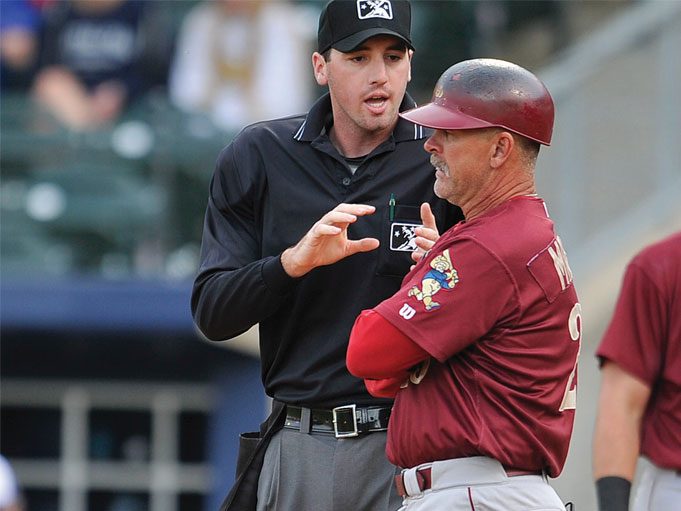You will say all kinds of things when you’re having a conversation, conference, discussion, talk, debate or heated exchange with a coach. But are there some comments that should never come out of your mouth? Some time ago, Referee asked subscribers in a “Your Call” survey what not to say. Some things are an obvious no-no, such as foul language. Here are some of the other things your peers suggested are off limits. If you’re currently using any of the following in your “conversations” with coaches, you might want to “eject” them from your dialogue.
1. “One more word and you’re out of here!”
It’s the classic overused phrase that needs to go away. And you can toss any other useless threats from your coach interaction vocabulary as well. What happens if the coach comes back with a compliment just to test you, or comes back with “word”? Are you prepared to eject the coach for that? Probably not. That’s why “one more word” is worthless at best, and adding fuel to the fire at worst. Don’t commit yourself to an action. It’s a no-win situation.
2. “Shut up.”
Now that’s an example of adding more gasoline. It’s antagonistic and unprofessional. Coaches should be allowed to have their say. If they cross the line and say something that warrants a reaction, use your tools within the rules — such as a technical foul, penalty or ejection — to “shut up” the coach. That’s the professional approach. That should be your approach.
3. “You’re wrong!”
If you don’t tell a coach he or she is wrong, that doesn’t mean you don’t think or know, in some cases, that the coach is wrong. It simply means you don’t say it, because it won’t lead to a positive result. Suggesting the coach is “right” all the time isn’t the answer either. Explaining what happened on a play or why you called what you called will let the coach know he or she is wrong (or right) without saying it. Sometimes telling the coach, “That’s not what I saw,” or “I’ll check the play after the game” serves to mitigate the situation and allows both parties to move on.
4. “Are you serious?”
Sometimes what comes out of the mouths of coaches is so far-fetched and ridiculous that you want to question their mindset. But that is not the right approach. Coaches have a big stake in the outcome of the game, and as a result, rational thinking can be lost at times. Assume they are serious. Keep your sense of humor about you and don’t take some statements too seriously and you’ll survive and thrive on the field and court.
5. “That’s not my call.”
Officiating is a team sport, just like any of the others. You and your partners are in it together, so you need to act like it. That statement can be taken to mean two things: “My partner is to blame,” or, “I saw what happened, but decided not to call it.” Both are bad. While it may not have been a call in your area, there are plenty of things you can say without shifting the negative spotlight on your partner. If you did see the play and could have helped your partner call something he or she missed, it’s your fault for not doing it. Getting the play right is your number-one priority.
6. “It’s just a game.”
You may argue, “It is just a game. Coaches shouldn’t act as if it is a life-or-death situation.” No one is suggesting that some coaches don’t need to learn some perspective. The key is that it’s not your job to teach it to them, and that phrase isn’t the way to teach that, anyway. You might as well be saying, “Who cares? I don’t,” because that is how it is going to be interpreted. Games are important to the coaches and participants, no matter the level or sport, and that isn’t going to change. Just as officiating is important to you. Respecting the game and the participants is important, whether or not it is reciprocated.
OK, the list can go on and on. Maybe you’ve heard other no-no comments come out of your fellow officials’ mouths or your own that shouldn’t have. What you say can make or break your career. So remain calm and in control during talks with coaches, and think before you speak. That will help eliminate a good percentage of problems.
What's Your Call? Leave a Comment:
Note: This article is archival in nature. Rules, interpretations, mechanics, philosophies and other information may or may not be correct for the current year.
This article is the copyright of ©Referee Enterprises, Inc., and may not be republished in whole or in part online, in print or in any capacity without expressed written permission from Referee. The article is made available for educational use by individuals.

















